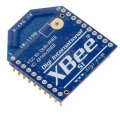ZigBee modules
ZigBee modules are wireless communication modules that use the ZigBee network structure for data transmission. ZigBee is a wireless network technology that enables communication between devices using a wireless radio signal. It is designed for low-energy and low-cost applications.
These modules use a network structure where each module can be both a network node and a network client. Each node can receive and send data and can also serve as a bridge for data transmission between other nodes.
ZigBee modules are available in different sizes and with different features. Some modules are designed for simple applications and have limited functionality, while others are equipped with advanced features and provide more connectivity options and greater device management. Some ZigBee modules have a built-in antenna system and can be connected to other devices using a UART or SPI interface. Other types of modules are designed to be connected to a printed circuit board (PCB) using a pin socket. These modules are usually smaller and more compact, which makes them an ideal choice for small and compact devices.
These modules are often used in smart home devices such as smart lights, thermostats, level meters, etc.
ZigBee modules are great for their low power consumption, easy installation, and low operating costs. They are also able to transmit data with little delay and are easily expandable for larger networks.
ZigBee modules are often used in various applications, such as home automation elements or wireless data transmissions in smart buildings and smart city networks. They are also often used to connect wireless sensors and other Internet of Things (IoT) devices.
